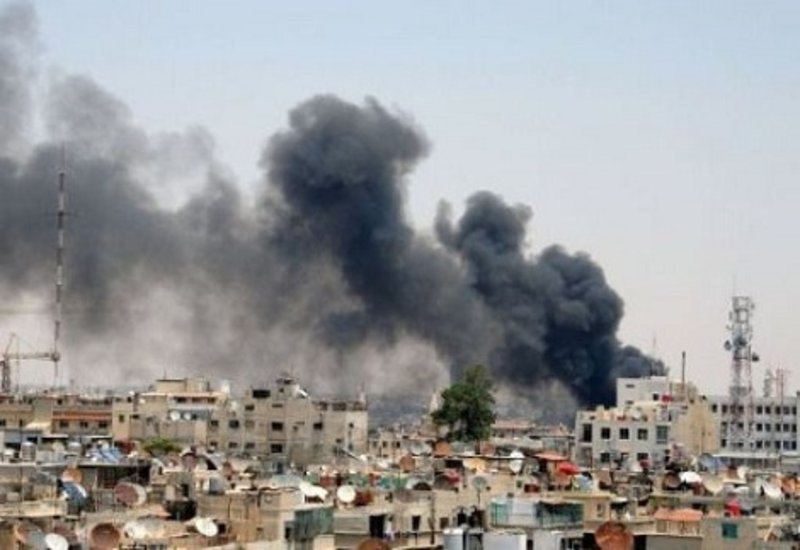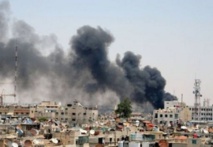"The situation in Syria is comparable to that in Germany after World War II," says Jaghi, the organizer of this year's reconstruction trade fair in the capital. "Germany is a good example of how such reconstruction can be achieved."
Fighting is still ongoing in many parts of the country but he and his company Al-Baschek are already hatching plans for the post-war period, identifying international companies to invite on board. Brochures on his desk for the "Rebuild Syria" event beat the drum of investment, "Because every crisis also creates opportunities!"
The World Bank and International Monetary Fund (IMF) estimate the price of Syria's reconstruction at up to 200 billion dollars. Infrastructure has been especially hard hit, with roads, bridges, water and electricity networks now in ruins in many parts of the country. The IMF also estimates that if the war ended tomorrow it would take about 20 years for Syria's GDP to return to pre-war levels, presupposing massive international engagement.
Meanwhile, German companies are keen but cautious in view of the far-reaching international sanctions that prohibit the export of numerous materials and equipment to Syria. Payment traffic is restricted and on-site logistics are dangerous and expensive.
"The Syrian market is of course also interesting for us," says spokesman Florian Attenhauser of the Sennebogen machine-building company in Bavaria, a leading world producer of cranes. Its products were showcased at last year's reconstruction fair by a Lebanese partner, however. "There is still a lot of reluctance at the projects being submitted, which is also due to political considerations," Attenhauser adds.
ThyssenKrupp and WSS Investments in the German state of North Rhine-Westphalia were also represented, along with Syrian ministries and companies, mainly from Lebanon. Under a photo of Syrian President Bashar al-Assad, the event prospectus assures companies of "privileged competition participation."
In general, German companies are currently still represented in Damascus by local partners and are mainly "just distributing brochures and advertising gifts," as one says.
"Syria and Iraq offer real potential for the German economy," says Philipp Andree, head of the Middle East unit of the German Chamber of Industry and Commerce (DIHK). But the basic prerequisite for German involvement remains the stabilization of the political situation and an end to the war.
While exports of German goods to Syria fell in the past six years by 93 per cent, according to customs data, German companies last year still supplied goods worth almost 52 million euros (62 million dollars), mainly medical equipment and medicines, but also steel engines, cars, insecticides and even ties.
Siemens says its focus is on a few select projects in the area of energy production and the supply of medical technology to Syria, and that it is "committed to contributing to reconstruction in this country."
At the government level, the German Ministry of Economics and Technology is now advising on the opening of new business operations in Syria. But the Foreign Office in Berlin says there is currently no active promotion of foreign trade there.
Other countries are more active, especially those that also support Syria militarily. At the start of the year, Syria and Iran signed several declarations of intent for investment in phosphate mines and telecommunications contracts.
According to Iranian government media, contracts worth 660 million dollars were signed in the energy sector. Russia and China are also expected to be major investors, according to reports from international observers such as the Washington-based Brookings Institution.
In turn, the Syrian side highlights all foreign interest in Syria as proof that despite criticism of the army's military action against the opposition and the civilian population, the country is no longer internationally isolated. And it is ready to trade.
"For us, quality counts," Jaghi stresses, again turning his gaze to Germany, but not only. "We would also like to see more Europeans here ... If the peace negotiations are successful, the Europeans will be queuing up."
-----------------------------------------------------------------------------------------------------------------------
Fighting is still ongoing in many parts of the country but he and his company Al-Baschek are already hatching plans for the post-war period, identifying international companies to invite on board. Brochures on his desk for the "Rebuild Syria" event beat the drum of investment, "Because every crisis also creates opportunities!"
The World Bank and International Monetary Fund (IMF) estimate the price of Syria's reconstruction at up to 200 billion dollars. Infrastructure has been especially hard hit, with roads, bridges, water and electricity networks now in ruins in many parts of the country. The IMF also estimates that if the war ended tomorrow it would take about 20 years for Syria's GDP to return to pre-war levels, presupposing massive international engagement.
Meanwhile, German companies are keen but cautious in view of the far-reaching international sanctions that prohibit the export of numerous materials and equipment to Syria. Payment traffic is restricted and on-site logistics are dangerous and expensive.
"The Syrian market is of course also interesting for us," says spokesman Florian Attenhauser of the Sennebogen machine-building company in Bavaria, a leading world producer of cranes. Its products were showcased at last year's reconstruction fair by a Lebanese partner, however. "There is still a lot of reluctance at the projects being submitted, which is also due to political considerations," Attenhauser adds.
ThyssenKrupp and WSS Investments in the German state of North Rhine-Westphalia were also represented, along with Syrian ministries and companies, mainly from Lebanon. Under a photo of Syrian President Bashar al-Assad, the event prospectus assures companies of "privileged competition participation."
In general, German companies are currently still represented in Damascus by local partners and are mainly "just distributing brochures and advertising gifts," as one says.
"Syria and Iraq offer real potential for the German economy," says Philipp Andree, head of the Middle East unit of the German Chamber of Industry and Commerce (DIHK). But the basic prerequisite for German involvement remains the stabilization of the political situation and an end to the war.
While exports of German goods to Syria fell in the past six years by 93 per cent, according to customs data, German companies last year still supplied goods worth almost 52 million euros (62 million dollars), mainly medical equipment and medicines, but also steel engines, cars, insecticides and even ties.
Siemens says its focus is on a few select projects in the area of energy production and the supply of medical technology to Syria, and that it is "committed to contributing to reconstruction in this country."
At the government level, the German Ministry of Economics and Technology is now advising on the opening of new business operations in Syria. But the Foreign Office in Berlin says there is currently no active promotion of foreign trade there.
Other countries are more active, especially those that also support Syria militarily. At the start of the year, Syria and Iran signed several declarations of intent for investment in phosphate mines and telecommunications contracts.
According to Iranian government media, contracts worth 660 million dollars were signed in the energy sector. Russia and China are also expected to be major investors, according to reports from international observers such as the Washington-based Brookings Institution.
In turn, the Syrian side highlights all foreign interest in Syria as proof that despite criticism of the army's military action against the opposition and the civilian population, the country is no longer internationally isolated. And it is ready to trade.
"For us, quality counts," Jaghi stresses, again turning his gaze to Germany, but not only. "We would also like to see more Europeans here ... If the peace negotiations are successful, the Europeans will be queuing up."
-----------------------------------------------------------------------------------------------------------------------









 Home
Home Politics
Politics











